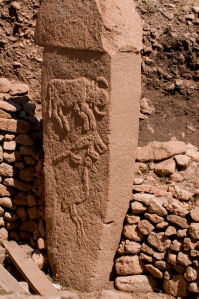Religion is guilty of setting too many finite premises within the human psyche, designed within confines of hidden and lost agendum across the continents and ages, within specific cultural, historical and geographical contexts, and today it just flays around in a designated area called Sunday, as the metaphorical snake that consumed itself – but is still in denial about its relevance.
 But Science? Is it much better? Is it the new panacea? A band-aid for disgruntled religious refugees seeking unity under the banner of atheism?
But Science? Is it much better? Is it the new panacea? A band-aid for disgruntled religious refugees seeking unity under the banner of atheism?
Generally it would appear mostly not, but just mostly.
Science is currently fashionable, we’re going through an age where science memes are cool, geeks want to know more, people want to be geeks, and it’s great that there are some excellent role models promoting actively the importance and wonder of science. This is a step in the right direction, another step onto the staircase leading to a brighter future (hopefully pulling us out of this present destination of certain destruction) and at least science (through it’s structure) enables more self-correction than religion.
On the face of it, I think science serves humanity in more constructive ways.
 However, when I find unusual Mars content, read about finds like Gobekli Tepi (pictured), follow the excavation of the buried bodies of the Easter Island statues, unusual, yet logical questions about consciousness, and all other ancient archeology, hidden technology (the work of Nicolai Tesla, Klaus Dona, Graham Hancock, Richard C Hoagland, Terrence McKenna, David Icke et al.)…
However, when I find unusual Mars content, read about finds like Gobekli Tepi (pictured), follow the excavation of the buried bodies of the Easter Island statues, unusual, yet logical questions about consciousness, and all other ancient archeology, hidden technology (the work of Nicolai Tesla, Klaus Dona, Graham Hancock, Richard C Hoagland, Terrence McKenna, David Icke et al.)…
Profound questions about our origins, how long we’ve lived here, and with whom we once shared this planet, take up residence in my head
With all that brain candy popping around up there, I start linking allegory with biblical accounts, Hindu, Roman and Greek authors etc. Because I think religion has a place in our world too. It’s where we’ve come from. But we’ve got to be honest about it – every other approach has led to wide scale suffering and misery.
Science without vision is blind and as discovered fossils, skeletons, hieroglyphs and sculptures reveal further extraordinary questions that go above and beyond the scope and practice of the current think-space representing the arena, the genuine seekers, with Earth-interest, who devote their lives and resources to uncovering these awesome questions, devoting their energies to progressing along these taboo lines, are NEVER rewarded for opening up the field … no… they’re often marginalised, and driven underground – where peer-review is non-existent and red-herring loving debunking ducks are fat and plentiful.
And, instead of these awesome and incredible finds becoming fuel for deeper searching, and wider questioning, involving the majority of the inhabitants that share the planet (not just the few who seek it out), they’re simply debunked and dismissed. Sad.
This video is a fine way to end my post, here’s Klaus Dona with an impressive body of finds to hammer home my point.
You don’t have to swallow everything you’re told, you’re never going to know it all, but that doesn’t mean you should ever stop asking questions.
I am stubborn about knowing the Truth … and I’m not just talking about the Buddhism truth about we are here and now, it’s all we have and everything is an illusion, sort of truth … but the Truth about our origins, answers to perplexing questions and getting things absolutely, exactly right (eventually). Today’s Daily post fitted this theme perfectly. Thanks.



Interesting post. Couldn’t agree more. We know we cannot reach the ultimate truth, but then curiosity drives us to learn more and more and more and we’re never disappointed.
But I think its a shame that in today’s age most people mistake science for technology. It is being driven less by curiosity and more by fashion.
LikeLike
Thanks, you’re right, not only that but technology couldn’t exist without science, engineering, art, maths and pretty much every other discipline… and the disciplines would be isolated and inaccessible without tech.
LikeLike
Great post!
LikeLike
Watched the video in its entirety and read your argument. From my view, You have made the case for my religion over your science.
LikeLike
“Though religion may be that which determines the goal, it has, nevertheless, learned from science, in the broadest sense, what means will contribute to the attainment of the goals it has set up. But science can only be created by those who are thoroughly imbued with the aspiration toward truth and understanding. This source of feeling, however, springs from the sphere of religion. To this there also belongs the faith in the possibility that the regulations valid for the world of existence are rational, that is, comprehensible to reason. I cannot conceive of a genuine scientist without that profound faith. The situation may be expressed by an image: science without religion is lame, religion without science is blind.”
Albert Einstein
LikeLike
In the midst of writing my dissertation, I recently came upon a research study that attempted to measure the capacity to heal from post traumatic stress disorder in youthful survivors who were tested and found suffering from PTSD. The 2008 Wenchuan Earthquake iIn China which was the 21st deadliest earthquake ever with over 50,000 dead. The 2,250 youth that survived it revealed their most pronounced horror in their lives had nothing to do with the the Earthquake that killed family members 6 months earlier. The most significant horror for them was academic pressure as the leading cause for PTSD.
The parallel that I see is that we often do not even know what questions to ask in science.
If we find a handheld figure carved out of stone with a titanium ball rattling inside, even though the stone itself may be 10,000 years old, why can’t we accept the reasonable answer that some child dropped a rattle his father fashioned for him five years earlier? And as leaders, why can’t we have the clarity of thought to find that Explanation reasonable as well.
LikeLike
I’m not entirely sure what your point is? The Klaus Dona video is about more than just a potential ‘thing’ made from ancient materials, five years ago. Gigantic skulls, large skeletons, materials carved from luddite – maybe one or two of those could be ‘inventions’ from last week, century, decade … but I didn’t cite just one source of information, and I most certainly didn’t provide them all either…
The point of my post was to encourage questioning. The people earnestly seeking answers aren’t like their debunkers that spend a couple of hours, days, weeks formulating a counter-argument… these people are professionals who put their careers and reputations on the line because they believe emphatically in what they’re doing, and that their voice is drowned out by puerile explanations from an anonymous peanut gallery that honestly don’t cover the spectrum of what’s uncovered, is untenable.
My point remains. Ask questions.
LikeLike
I appreciate your reply and clarification for this sluggish brain of mine.
LikeLike
Don’t undermine yourself, everyone is entitled to an opinion and I appreciate you taking the time to share yours. Good luck with your dissertation,
LikeLike
it all depends on how we use them, if we abuse science is death warrant, if we abuse religion the destruction is nothing in compare to it. as long as they are not combined.
LikeLike
Thank you for sharing your insight 🙂
I have no faith in the top floaters of society – they abuse everything. Look at the state of the world, and say it isn’t so. I wish it wasn’t true.
Both science and religion describe different aspects of the same organism (life, the universe and everything), and both are necessary and vital to society…
But, in this age of Information, it’s impossible to have an impartial discussion about any religion without it descending into unproductive, childish name calling.
And it seems that certain topics in science are heading that way too, Science is often (conveniently) directed by the proponents of profit (the top floaters if you will :)), and if it continues down the slippery slope it’s currently slipping along, it’ll end up as contentious and divisive as religion.
LikeLike
I think anything is better than religion.
LikeLike